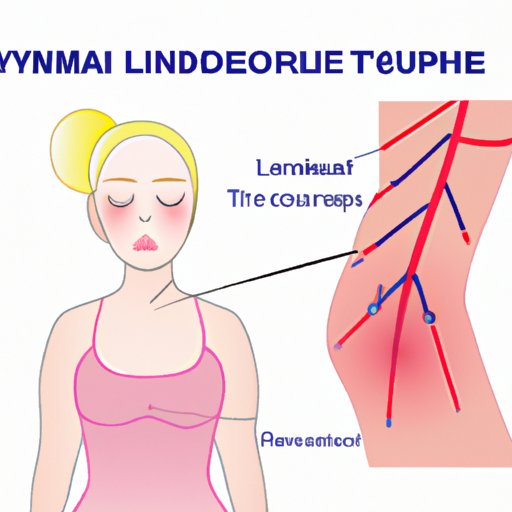
Introduction
The lymphatic system is a crucial component of our overall health and well-being. It plays a major role in our immune system, helps remove toxins and waste from the body, and maintains fluid balance. However, poor lymphatic drainage can lead to a variety of symptoms that can affect our day-to-day lives. It’s important to recognize these symptoms so that we can take steps to address them and maintain optimal lymphatic health.
This article will explore the various symptoms of poor lymphatic drainage, as well as other factors that can contribute to this issue. It is intended for anyone who is interested in learning more about lymphatic health, as well as those who may be experiencing symptoms of poor lymphatic drainage.
The Basics of Lymphatic Drainage
The lymphatic system is a network of vessels and tissues that helps remove excess fluid from the body and plays a critical role in our immune system. Unlike other organ systems, the lymphatic system does not have a central pump like the heart, so lymphatic drainage relies on muscle contractions from physical activity to move the fluid.
Lymph nodes are small bean-shaped structures that are found throughout the body and act as filters to remove harmful substances from the lymphatic fluid. They also contain white blood cells that help fight off infections.
Lymphatic drainage is important for overall health because it helps remove waste and toxins from the body, maintain fluid balance, and support the immune system.
Recognizing the Symptoms of Poor Lymphatic Drainage
Swollen Lymph Nodes
Swollen lymph nodes, also known as lymphadenopathy, are a common symptom of poor lymphatic drainage. Lymph nodes can become swollen for many reasons, including infections, injuries, and certain medical conditions such as lymphoma or leukemia. When the lymphatic system is not functioning properly, lymph nodes may remain swollen for longer periods of time.
Chronic Fatigue
Chronic fatigue is another common symptom of poor lymphatic drainage. When the lymphatic system is not working efficiently, toxins and waste can build up in the body, leading to feelings of fatigue and sluggishness. This can also be compounded by poor sleep quality, which can further exacerbate feelings of fatigue and exhaustion.
Fluid Retention
Fluid retention, also known as edema, is another symptom of poor lymphatic drainage. When the lymphatic system is not functioning properly, excess fluid can accumulate in the tissues, leading to swelling and discomfort. This is particularly common in the legs and feet, but can occur in other parts of the body as well.
Other symptoms that may indicate poor lymphatic drainage include frequent infections, skin rashes or itching, digestive issues, and headaches.
Other Factors That Can Contribute to Poor Lymphatic Drainage
In addition to underlying medical conditions, poor diet, lack of exercise, and certain lifestyle factors can contribute to poor lymphatic drainage. A diet high in processed foods, alcohol, and sugar can increase inflammation in the body and hinder lymphatic function. A sedentary lifestyle can also lead to poor lymphatic drainage, as physical activity is necessary to stimulate lymphatic flow.
Other factors that can contribute to poor lymphatic drainage include stress, dehydration, and environmental toxins.
Importance of Seeking Medical Advice
If you suspect you may have poor lymphatic drainage or are experiencing any of the symptoms discussed in this article, it is important to seek medical advice from a qualified healthcare professional. A proper diagnosis and treatment plan can help address underlying medical conditions that may be contributing to poor lymphatic drainage, and can provide guidance on lifestyle changes that can promote optimal lymphatic health.
Conclusion
Poor lymphatic drainage can lead to a variety of symptoms that can impact our day-to-day lives. Recognizing these symptoms and knowing the factors that contribute to poor lymphatic drainage is crucial for maintaining optimal health. By making lifestyle changes such as eating a healthy diet, staying hydrated, and staying physically active, we can promote healthy lymphatic function and improve our overall well-being.
If you suspect you may have poor lymphatic drainage, don’t hesitate to seek medical advice from a qualified healthcare professional. With the right diagnosis and treatment plan, you can get back on the road to optimal lymphatic health.




